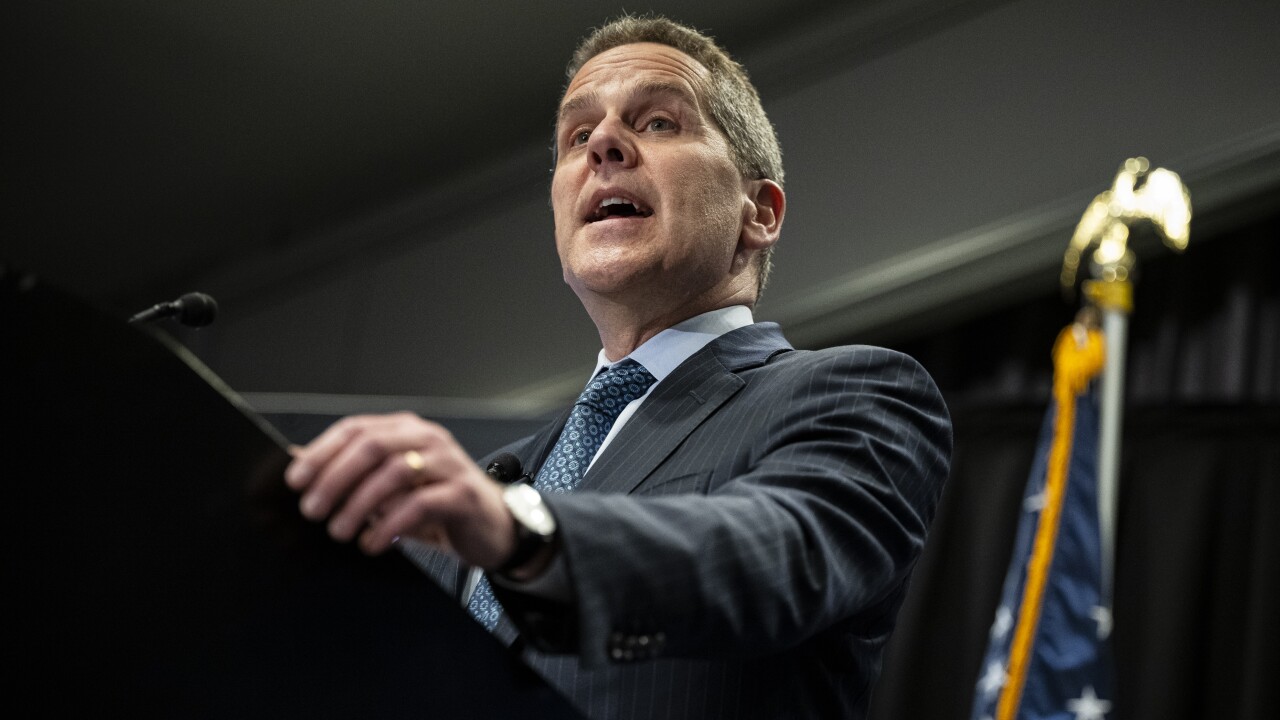The Consumer Financial Protection Bureau is conducting a review of the Federal Reserve's 2009 overdraft protection rule to determine the effects on small banks and credit unions.
The CFPB said Monday it is seeking public comment on whether the overdraft rule “should be amended or rescinded” to minimize “any significant economic impact.” The review comes as some Democratic lawmakers have proposed even stricter overdraft limits.
The rule requires that banks offer consumers the right to “opt in” to overdraft service for a fee. It prohibits financial institutions from charging overdraft fees on ATM and one-time debit card transactions unless a consumer gives his or her consent.

Some data suggests the rule has had a significant impact on smaller financial institutions, the CFPB said. The agency's notice said the bureau estimated in 2013 that the rule "led to a material decrease in the amount of overdraft fees paid by consumers."
But just as the CFPB under Trump-appointed Director Kathy Kraninger is reviewing the rule, some Democrats in Congress have said the opt-in requirement was not enough. For example, a 2018 bill authored by Sens. Sherrod Brown, D-Ohio, and Cory Booker, D-N.J., would ban overdraft fees on debit card and ATM withdrawals and impose monthly and annual limits on overdraft fees, among other things.
Under the rule, banks typically provide consumers with an "opt in" notice when a consumer first opens a checking account and the bank explains fees of up to $35 associated with overdrafting an account.
Banks with assets of more than $1 billion collected $11.5 billion in overdraft fees in 2018, according to data from the Federal Deposit Insurance Corp.
The CFPB review is being carried out under the 1980 Regulatory Flexibility Act, which generally seeks to have regulations be proportional to the scale of small businesses. Companies will have 45 days to submit comments to the bureau as part of the review. Authority for regulating overdraft fees was transferred from the Fed to the CFPB in the 2010 Dodd-Frank Act.
The agency also said it plans to use the Regulatory Flexibility Act to periodically review all agency rules issued within 10 years to determine the impact on small businesses and if the rules “are consistent with the stated objectives of applicable statutes.”
During congressional hearings in April, five out of six of large-bank CEOs said they would support legislation that put limitations on banks' ability to collect money from overdraft fees, including a ban on the reordering of transactions from high to low amounts, which tends to maximize overdraft fees.
Many large banks have abandoned the reordering practices. Still, many small and midsize banks rely heavily on overdraft fees for as much as 50% of their revenue, so any rolling back of the regulation would likely have a benefit on financial institutions' bottom line.
In 2017, the CFPB released its third
Former CFPB Director Richard Cordray, appointed in the Obama administration, had considered tougher restrictions and was expected to issue a new overdraft rule, but never did. Cordray was replaced on an acting basis by Mick Mulvaney — now acting White House chief of staff — who dropped any reference to overdraft policy in the agency's rulemaking agenda.
The CFPB's
The bureau also questioned whether and how it could "reduce the costs of the Overdraft Rule on small entities."
In the 2017 study, the CFPB found that consumers who frequently overdraw their checking accounts pay nearly $450 more in overdraft penalty fees a year than those who opt out of coverage. Though just 9% of consumers frequently overdraw their accounts, these so-called frequent overdrafters paid a whopping 79% of all overdraft and insufficient funds fees, the
The CFPB assumed rulemaking authority for Regulation E, which implements the Electronic Funds Transfer Act, including the overdraft rule, in 2011.





